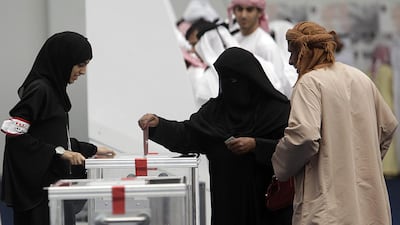A few weeks ago, the formation of the Emirates Committees for the forthcoming Federal National Council elections was announced – a step which, according to Dr. Anwar Gargash, Minister of State for FNC Affairs, "will facilitate the successful implementation of the elections and reflect positively on the development of the country's political process".
The committees’ creation is indicative of the Government’s desire to promote greater participation in the elections. With turnout under 30 per cent last time, there’s certainly scope for improvement. Over the past half-century, I’ve taken part in more than 10 British general elections. Here, campaigning is very different, but perhaps some of what I’ve learnt is of relevance.
First, it should be easier for people to vote. In Britain, there are polling stations in every urban area and also in little villages. Even in rural areas, it’s generally not necessary to travel more than a few kilometres to find one. I have fond memories of one, in the tiny Scottish hamlet of Cappercleuch, serving a mere 50 voters, where turnout was generally among the highest in the area. At the last FNC elections, some people had to make a round journey of well over 100km to get to a polling station. More polling stations, with less of a journey involved, might help to increase turnout.
Secondly, potential voters should feel that the person or institution for which they are voting is worthy of support. Not only should their candidate of choice impress them, but the parliament, or FNC in our case, must be seen as a useful institution. In recent decades, as the role of individual British MPs has seemed to decline and parliament has lost respect because of the antics of some of its members, so the percentage of those who vote has fallen.
Here, the FNC has shown its determination to become more effective, with ministers being called to account and with a whole raft of proposals for new legislation. Yet the media, with honourable exceptions, has paid little attention. It has generally limited itself to fairly cursory coverage of the occasional debate or of a minister being questioned, but done little to explain the daily work of FNC members. Before the end of the current FNC’s term, it would be good to see more media coverage of its activities and relevance. If voters believe the FNC is doing a useful job, they’re more likely to vote for it.
Perhaps there could be more effort to inculcate an awareness of the FNC and its role among the young. How often are debates attended by university students and secondary schoolchildren? How many FNC members have visited the schools and colleges of the emirates that they represent in the council? That might not generate enthusiasm among voters this year, but it could help when those students are themselves of voting age five years from now.
It’s now 64 days to the next British election and campaigning is well under way. By the time of the election, many people will be sick and tired of it. At the last FNC elections in 2010, though, the campaigning period was rather short: if it is longer this year, candidates would have more time to contact voters, engage with them at meetings, through house-to-house calls, or using whatever technique they choose. Posters on lampposts may make a splash, but my own experience suggests that personal encounters between candidates and voters are enormously important.
Television debates can be useful too: then, to be blunt, voters can assess whether a candidate talks sense. Social media may, in reality, be of much less value.
The FNC elections are an important way to promote greater public participation in the process of governance. They offer, too, evidence of the peaceful way in which the UAE addresses political issues, in contrast to most of the region. Next autumn’s elections are of relevance far beyond our borders. They need to be carefully promoted.
Peter Hellyer is a consultant specialising in the UAE’s history and culture



